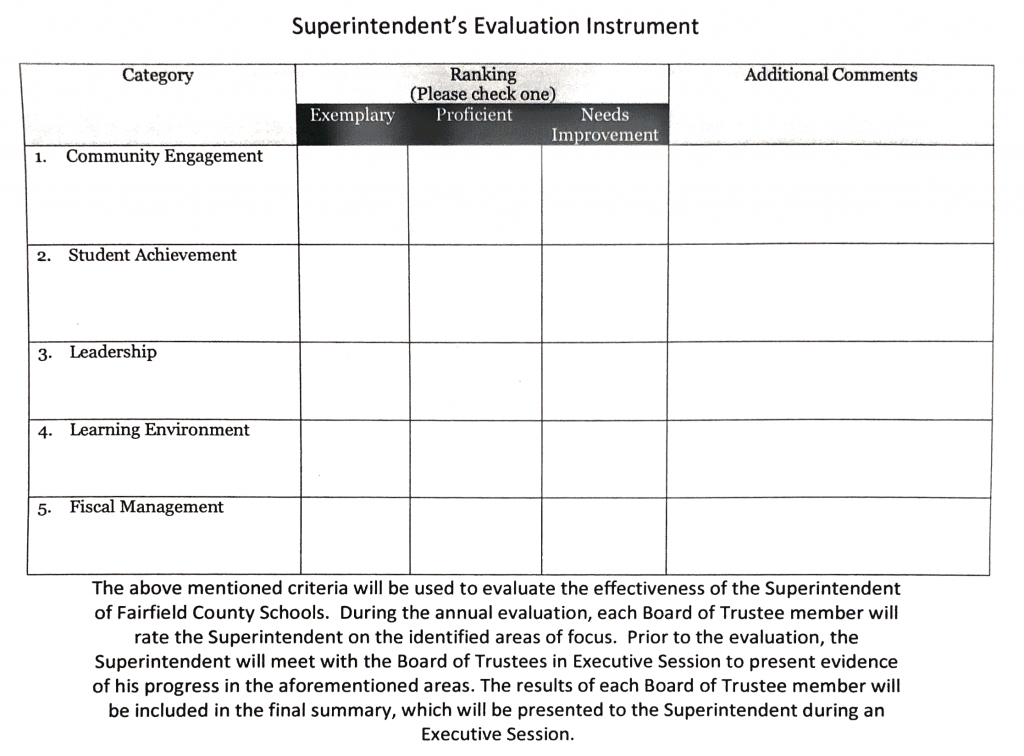WINNSBORO – Fairfield County Superintendent Dr. J.R. Green received another round of positive reviews on his annual evaluation, the district’s Board of Trustees’ chairman recently during the school board meeting last week.
Completed evaluation forms from individual board members, which typically include comments about the superintendent’s performance, were not made available as of press time.
William Frick, chairman of the Fairfield County Board of Trustees, said following executive session, where the forms were filled out by board members, that Green received high marks.
“It looks like there are a whole lot of Exemplaries on there,” Frick said, patting Green on the back. “I, for one, am very proud that you are with us. Congratulations on your continued success.”
Board trustee Paula Hartman, though, said she wrote on her evaluation form that Green needed to be more transparent with the board and keep everyone more informed.
Hartman also scrutinized the superintendent evaluation form itself. The form hasn’t been updated since at least 2012, when Green became superintendent.
Hartman said the district’s one-page form is limited and suggested there be a measurement for each category.
Asked after the meeting about her comment, she said the evaluation form doesn’t show whether or not the superintendent has shown progress or list any specific goals or criteria that superintendents should meet, something she noted other districts include.
S.C. Rep. Annie McDaniel, D-Winnsboro, who previously served on the Fairfield school board, raised similar concerns about the Fairfield forms during Green’s evaluation in December 2015.
“I would like the record to reflect that I’m deeply concerned that there are not goals and objectives set,” McDaniel said at the time. “This instrument is not the instrument that the [S.C.] School Board Association recommends. There should be more specific goals listed under each of the different categories.”

The forms provide three possible ratings – Exemplary, Proficient or Needs Improvement – for five performance criteria that include Community Engagement, Student Achievement, Leadership, Learning Environment and Fiscal Management. (See form on page 5.)
In Richland 2, for example, the typical evaluation form is six pages in length and rates superintendents using six categories. Each category has between four and eight specific performance standards. There are also five ratings instead of three: Distinguished, Commendable, Meets Expectations, Needs Improvement and Unsatisfactory.
Trustees didn’t delve into Green’s contract at last week’s board meeting. Frick said Green’s contract was not extended.
At the time of Green’s previous evaluation in December 2018, the board added a year to Green’s contract, which expires in 2024.
The board also didn’t discuss Green’s compensation at last week’s meeting.
However, documents that The Voice previously obtained through the S.C. Freedom of Information Act state that Green is automatically entitled to a 5 percent annual increase in pay whenever he receives a “Satisfactory” rating or better.
Green’s base pay prior to the Nov. 19 board meeting was $182,287. Five percent of $182,287 is $9,114.35, which would automatically result in a salary increase to $191,401 without a vote.
Generous benefits push Green’s total compensation well over $200,000.
Green’s presumably high marks come in spite of the district experiencing a series of setbacks in the past academic year.
In September, after nearly a year of lobbying, the school district’s proposed “Teacher Village” fell apart after a North Carolina hedge fund offering to build the proposed subdivision catering to teachers backed out.
Gorelick Brothers Capital was willing to invest $3.6 million in the project, but the firm also wanted approximately $600,000 in tax breaks.
Gorelick also balked at Fairfield County’s request for an indemnification clause that would’ve protected taxpayers should the Teacher Village spawn litigation. The county’s attorney said a Teacher Village-related lawsuit could potentially reach “six figures.”
Student achievement also slid at some Fairfield County schools during the 2018-2019 school year.
While three schools received either Good or Excellent ratings, Fairfield Middle School fell from a Below Average rating in 2017-18 to Unsatisfactory in 2019, receiving only 22 of a possible 100 points, according to S.C. Report Card data released in October.
Only seven other middle schools in South Carolina received lower rates, report card data shows. Fairfield High School received an Average rating for the second year in a row, but in 2019 fell to one point above a Below Average rating after receiving 51 out of 100 points.
Since 2012, when Green became superintendent, the district has received an Average rating every year except in 2016 and 2017, when the state didn’t issue accountability ratings.
Green has received multiple contract extensions, and his base pay has risen more than $50,000 since 2012, when his base salary was $140,000.











